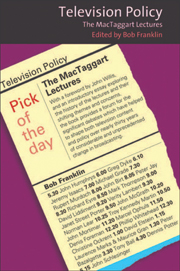Book contents
- Frontmatter
- Contents
- Acknowledgements
- Foreword
- Introduction
- The James MacTaggart Lectures
- TV Drama: The Case against Naturalism
- Naturalism and Television
- Taboos in Television
- Signposting Television in the 1980s: The Fourth Television Channel
- Television Drama, Censorship and the Truth
- The Day after Tomorrow: The Future of Electronic Publishing
- The Primacy of Programmes in the Future of Broadcasting
- Reflections on Working in Film and Television
- ‘Opening up the Fourth Front’: Micro Drama and the Rejection of Naturalism
- Power and Pluralism in Broadcasting
- Ethics, Broadcasting and Change: The French Experience
- Freedom in Broadcasting
- Deregulation and Quality Television
- The Future of Television: Market Forces and Social Values
- The Future of the BBC
- Occupying Powers
- A Culture of Dependency: Power, Politics and Broadcasters
- Talent versus Television
- A Glorious Future: Quality Broadcasting in the Digital Age
- Rewarding Creative Talent: The Struggle of the Independents
- Television versus the People
- Public-Interest Broadcasting: A New Approach
- A Time for Change
- The Soul of British Television
- Television's Creative Deficit
- Freedom of Choice: Public-Service Broadcasting and the BBC
- First Do No Harm
- Appendix A Edinburgh International Television Festival, 29 August–2 September 1977: Programme
- Appendix B Précis of Ted Turner, James MacTaggart Lecture 1982; Dr Jonathan Miller, James MacTaggart Lecture 1983
- Index
Freedom in Broadcasting
from The James MacTaggart Lectures
Published online by Cambridge University Press: 05 August 2013
- Frontmatter
- Contents
- Acknowledgements
- Foreword
- Introduction
- The James MacTaggart Lectures
- TV Drama: The Case against Naturalism
- Naturalism and Television
- Taboos in Television
- Signposting Television in the 1980s: The Fourth Television Channel
- Television Drama, Censorship and the Truth
- The Day after Tomorrow: The Future of Electronic Publishing
- The Primacy of Programmes in the Future of Broadcasting
- Reflections on Working in Film and Television
- ‘Opening up the Fourth Front’: Micro Drama and the Rejection of Naturalism
- Power and Pluralism in Broadcasting
- Ethics, Broadcasting and Change: The French Experience
- Freedom in Broadcasting
- Deregulation and Quality Television
- The Future of Television: Market Forces and Social Values
- The Future of the BBC
- Occupying Powers
- A Culture of Dependency: Power, Politics and Broadcasters
- Talent versus Television
- A Glorious Future: Quality Broadcasting in the Digital Age
- Rewarding Creative Talent: The Struggle of the Independents
- Television versus the People
- Public-Interest Broadcasting: A New Approach
- A Time for Change
- The Soul of British Television
- Television's Creative Deficit
- Freedom of Choice: Public-Service Broadcasting and the BBC
- First Do No Harm
- Appendix A Edinburgh International Television Festival, 29 August–2 September 1977: Programme
- Appendix B Précis of Ted Turner, James MacTaggart Lecture 1982; Dr Jonathan Miller, James MacTaggart Lecture 1983
- Index
Summary
Rupert Murdoch offers a highly contentious and critical assessment of public service broadcasting, denouncing it as an ideology deployed by ‘propagandists’ to protect the interests of a narrow broadcasting elite, but with debilitating consequences for British broadcasting. Most significantly, public service broadcasting and its ‘guardians’ militate against the prospects for viewer freedom and choice. Such restrictions ‘are not compatible with a mature democracy’.
This ideology of public service broadcasting is a form of ‘special pleading’ which misrepresents an economically inefficient, paternalistic and unaccountable broadcasting system, as the only organisational structure capable of delivering quality programmes and encouraging creative risk-taking in programme-making. Murdoch's argument rests on a ‘simple principle’. Namely, ‘in every area of economic activity in which competition is attainable, it is much to be prefered to monopoly’.
By contrast public service broadcasting is nowhere clearly defined, although Murdoch redresses this problem by suggesting that ‘anybody who, within the law of the land, provides a service which the public wants at a price it can afford is providing a public service’ (subsequent MacTaggart lecturers have contested this definition). Consequently ‘if in the years ahead we can make a success of Sky Television, that will be as much a public service as ITV’. Murdoch offers a number of examples to illustrate his argument that the market-led American system has been substantially more successful in creating greater quality and diversity of programming than British television informed by the principles of public service broadcasting.
- Type
- Chapter
- Information
- Television PolicyThe MacTaggart Lectures, pp. 131 - 138Publisher: Edinburgh University PressPrint publication year: 2005



